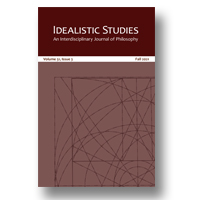|
|
|
1.
|
Idealistic Studies:
Volume >
51 >
Issue: 1
Jennifer A. Bates
Editor's Note
view |
rights & permissions
| cited by
|
|
|
|
|
articles |
|
2.
|
Idealistic Studies:
Volume >
51 >
Issue: 1
Joseph Gamache
Affectivity in Moral Epistemology:
Edith Stein and Dietrich von Hildebrand
abstract |
view |
rights & permissions
| cited by
Recent epistemology and value theory have become more open to the role played by affectivity in the constitution of human knowledge of value. In this paper, two figures important to the phenomenological and personalistic traditions are retrieved as precedents for this contemporary development: Edith Stein and Dietrich von Hildebrand. In the first part of the paper, Stein’s phenomenology of affective acts is adapted as an account of the structure of “value-grasping acts.” The second part of the paper identifies two difficulties that arise on the basis of Stein’s account: (1) how do we know that an emotion constitutes a response to intrinsic value, and (2) how do we know an emotional response to value is most attuned to its object? The remainder of the paper responds to these difficulties, thereby legitimating the account as a viable moral epistemology. These responses draw inspiration from von Hildebrand’s phenomenological accounts of value-response and freedom.
|
|
|
|
|
3.
|
Idealistic Studies:
Volume >
51 >
Issue: 1
Luis Fellipe Garcia
Nature at the Core of Idealism:
The Birth of Two Strands of Post-Kantian Philosophy
abstract |
view |
rights & permissions
| cited by
This paper claims that the inner drive of the discussion leading to the philosophical rupture between Fichte and Schelling is the problem of the independence of nature. I argue that the otherwise rich literature on the subject, by not engaging with this problem, has led to a false dichotomy between two equally unsatisfactory possibilities of interpretation: (a) Schelling’s misunderstanding of Kant’s transcendental method or (b) his overcoming of it. On my account, once one engages with Schelling’s philosophy of nature, it becomes clear that he, just as Fichte, is exploring the inner tensions of Kant’s philosophy, even though he does it in a different and original direction.
|
|
|
|
|
4.
|
Idealistic Studies:
Volume >
51 >
Issue: 1
Austin Lawrence
The Self as Activity:
Beyond Reductionist and Non-Reductionist Theories of Selfhood
abstract |
view |
rights & permissions
| cited by
This paper aims to defend a dialectical account of selfhood in the context of the contemporary debates on personal identity in Anglo-American philosophy. I interpret Reductionism and Non-Reductionism—the two dominant positions in contemporary Anglo-American philosophy—as forming something analogous to an antinomy. Reductionists argue that the self is merely an identity that is reducible to a set of facts, while Non-Reductionists argue that the self is a separate entity beyond any set of facts. I argue that a comprehensive view of the self requires aspects from both of these positions. The self, then, should be understood as an ongoing activity that relates the various features of one’s identity together.
|
|
|
|
|
5.
|
Idealistic Studies:
Volume >
51 >
Issue: 1
Nikolaj Pilgaard Petersen
Non-Constitutive Cosmopsychism:
Countering the Decombination Problem
abstract |
view |
rights & permissions
| cited by
Due to the difficulties of providing an adequate physicalist solution to the problem of consciousness, recent years have seen explorations of different avenues. Among these is the thesis of cosmopsychism, the view that the cosmos as a whole possesses consciousness. However, constitutive cosmopsychism is faced with the difficult problem of decombination: how to consistently maintain the claim that individual subjects are grounded in one absolute consciousness. This paper suggests a solution by outlining a theoretical model of a broadly idealistic and quantitative substance-monistic character. The key idea here is a triadic rather than monistic or dualistic conception of the subject. This conception allows us to affirm that the individual subject exists while simultaneously holding that its substance component is part of the one, undivided substance. This substance is in turn the substantive component of an all-encompassing, absolute subject. Notably, this model avoids the problem of decombination.
|
|
|
|
|
book review |
|
6.
|
Idealistic Studies:
Volume >
51 >
Issue: 1
Berker Basmaci
Karen Ng, Hegel's Concept of Life: Self-Consciousness, Freedom, Logic
view |
rights & permissions
| cited by
|
|
|
|
